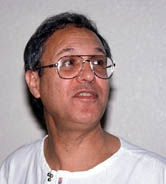Related Research Articles
Industrial and organizational psychology which is also known as occupational psychology, organizational psychology, or work and organizational psychology; is an applied discipline within psychology. Industrial, work and organizational psychology (IWO) is the broader global term for the field internationally.
Applied psychology is the use of psychological methods and findings of scientific psychology to solve practical problems of human and animal behavior and experience. Mental health, organizational psychology, business management, education, health, product design, ergonomics, and law are just a few of the areas that have been influenced by the application of psychological principles and findings. Some of the areas of applied psychology include clinical psychology, counseling psychology, evolutionary psychology, industrial and organizational psychology, legal psychology, neuropsychology, occupational health psychology, human factors, forensic psychology, engineering psychology, school psychology, sports psychology, traffic psychology, community psychology, and medical psychology. In addition, a number of specialized areas in the general field of psychology have applied branches. However, the lines between sub-branch specializations and major applied psychology categories are often blurred. For example, a human factors psychologist might use a cognitive psychology theory. This could be described as human factor psychology or as applied cognitive psychology.
Counseling psychology is a psychological specialty that encompasses research and applied work in several broad domains: counseling process and outcome; supervision and training; career development and counseling; and prevention and health. Some unifying themes among counseling psychologists include a focus on assets and strengths, person–environment interactions, educational and career development, brief interactions, and a focus on intact personalities.
Community psychology studies the individuals' contexts within communities and the wider society, and the relationships of the individual to communities and society. Community psychologists seek to understand the quality of life of individuals within groups, organizations and institutions, communities, and society. Their aim is to enhance quality of life through collaborative research and action.
Situated cognition is a theory that posits that knowing is inseparable from doing by arguing that all knowledge is situated in activity bound to social, cultural and physical contexts.
Ecological psychology is the scientific study of perception-action from a non-functionalism approach. Ecological psychology is a school of psychology that follows much of the writings of Roger Barker and James J. Gibson. Those in the field of Ecological Psychology reject the mainstream explanations of perception laid out by cognitive psychology. The ecological psychology can be broken into a few sub categories, perception, action, and dynamical systems. As a clarification, many in this field would reject the separation of perception and action, stating that perception and action are inseparable. These perceptions are shaped by an individual's ability to engage with their emotional experiences in relation to the environment and reflect on and process these. This capacity for emotional engagement leads to action, collective processing, social capital, and pro environmental behaviour.
Problem solving consists of using generic or ad hoc methods in an orderly manner to find solutions to problems. Some of the problem-solving techniques developed and used in philosophy, artificial intelligence, computer science, engineering, mathematics, medicine and societies in general are related to mental problem-solving techniques studied in psychology and cognitive sciences.
Environmental psychology is an interdisciplinary field that focuses on the transactions between individuals and their surroundings. It examines the way in which the natural environment and our built environments shape us as individuals. Environmental Psychology emphasises how humans change the environment and how the environment changes humans experiences and behaviors. The field defines the term environment broadly, encompassing natural environments, social settings, built environments, learning environments, and informational environments.
Behavior settings are theorized entities that help explain the relationship between individuals and the environment - particularly the social environment. This topic is typically indexed under the larger rubric of 'Ecological Psychology'. However, the notion of behavior setting is offered here in more detail and with more specificity than is found in the larger entry under 'Ecological Psychology' or 'Environmental Psychology'.
Robert Paul Abelson was a Yale University psychologist and political scientist with special interests in statistics and logic.
Edward Steven Reed was an American philosopher of science and an ecological psychologist in the vein of James J. Gibson.

Shalom H. Schwartz is a social psychologist, cross-cultural researcher and creator of the Theory of Basic Human Values. He also contributed to the formulation of the values scale in the context of social learning theory and social cognitive theory.
Socio-ecological models were developed to further the understanding of the dynamic interrelations among various personal and environmental factors. Socioecological models were introduced to urban studies by sociologists associated with the Chicago School after the First World War as a reaction to the narrow scope of most research conducted by developmental psychologists. These models bridge the gap between behavioral theories that focus on small settings and anthropological theories.
Hazel June Linda Rose Markus is a social psychologist and a pioneer in the field of cultural psychology. She is the Davis-Brack Professor in the Behavioral Sciences at Stanford University in Stanford, California. She is also a founder and faculty director of Stanford SPARQ, a "do tank" that partners with industry leaders to tackle disparities and inspire culture change using insights from behavioral science. She is a founder and former director of the Research Institute of the Center for Comparative Studies in Race and Ethnicity (CCSRE). Her research focuses on how culture shapes mind and behavior. She examines how many forms of culture influence the self, and in turn, how we think, feel, and act.
George Mandler was an Austrian-born American psychologist, who became a distinguished professor of psychology at the University of California, San Diego.
Psychology encompasses a vast domain, and includes many different approaches to the study of mental processes and behavior. Below are the major areas of inquiry that taken together constitute psychology. A comprehensive list of the sub-fields and areas within psychology can be found at the list of psychology topics and list of psychology disciplines.

Robert S. Wyer Jr. is a visiting professor at the University of Cincinnati and Professor (Emeritus) at the University of Illinois, Urbana-Champaign. He received his doctoral degree from the University of Colorado. His research interests cut across numerous areas of social information processing, including knowledge accessibility, comprehension, memory, social inference, the impact of affect on judgment and decisions, attitude formation and change, and consumer judgment and decision making.
Staffing theory is a social psychology theory that explores the effects of behavior settings being either understaffed or overstaffed. Understaffing refers to the idea that there are not enough people for what for the behavior setting promotes, whereas overstaffing is the overabundance of people. The term staffing theory was previously known as manning theory, but was renamed.

The Campbell paradigm is a behavioral theory from social psychology. The paradigm was developed by social psychologist Florian Kaiser and his colleagues in 2010, building on an earlier suggestion by Donald T. Campbell, after whom the paradigm is named. It offers an explanation of why and when individuals engage in particular behaviors. Its main application is climate and environmental protection behavior.
References
- ↑ e.g., Noschis, K. (1980/81). Review of An Introduction to Ecological Psychology, Architecture & Behavior, 1, 171–174; Taylor, R. B. (1979). Ecological psychology demystified. Contemporary Psychology, 24, 979–980.
- ↑ Kaminski, G. (1983). The enigma of ecological psychology. Journal of Environmental Psychology, 3, p. 88.
- ↑ Scott, M. M. (2005). A powerful theory and a paradox: Ecological psychologists after Barker. Environment and Behavior, 37, p. 309.
- ↑ "Eugene Garfield, Ph.D. - Home Page".